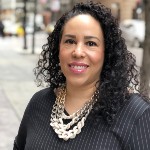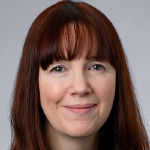- Austin Financial Services and Stearns Bank Enter New Strategic Joint Venture
- Economic Outlook
- ABL Navigates New Economic Crosswinds
- Gordon Brothers Appoints Liz Blue Head of North American Business Development, Retail & Real Estate Services
- Ares Commercial Finance Launches a Healthcare Asset Based Lending Platform
Spotlight on SFNet's Diversity, Equity & Inclusiveness Committee
By Michele Ocejo

Lizzy (pronounced LEE-see) Diaz-Ortiz is a Chicago-based attorney with over 15 years of experience leading culture change for organizations. Most recently, her efforts have focused on driving diversity and inclusion programs in which she helps organizations create a culture of belonging to drive better business results.
She grew up as a military brat living and working all over the world and spent her formative years in Germany, quite different than the rest of her extended Puerto Rican family. Her diverse experiences as an Army dependent laid the groundwork for a three-year professional stint in Mexico City as an adult. More importantly, it provided the foundation for her desire to work in the diversity, equity, and inclusion realm and advocate for equitable outcomes.
Lizzy is BMO Harris Bank's subject matter expert for affirmative action, equal employment opportunity, and federal civil rights laws focused on people of color, women, veterans, and individuals with disabilities. She also has deep expertise within the financial services and banking industry. In her current role, she focuses on people of color, women, individuals with disabilities, protected veterans, Indigenous Peoples, and LGBTQ+ communities. Lizzy holds a JD from Chicago-Kent College of Law where she obtained an Intellectual Property Law Certificate and was a Staff Editor for the Journal of Intellectual Property. She also holds a BS in Political Science from Florida State University.
She also devotes her personal time to organizations that support diversity. As a Board Member at large of the Professional Women's Club of Chicago, she designed and continues to lead a multi-year diversity and inclusion strategy while also presenting continuing legal education seminars on diversity and inclusion through the Business Law Network, Chicago Bar Association, Minority Bar CLE Conference, and Association of Corporate Counsel. She is also past national president of the law student division of the Hispanic National Bar Association.
Lizzy is multi-lingual in English, Spanish, and conversational German. She resides in Chicago with her husband and daughter.
Please provide a bit of background. How did you get in the industry? What does your current role entail?
My entry into banking was completely unplanned. After graduating law school and doing contract work for years, I was fatigued and realized I did not want to practice law. A friend referred me for a position at LaSalle Bank, a large, regional bank in Chicago, in commercial mortgage-backed securities negotiating custodial agreements with large investment banks. Nearly the entire department was comprised of attorneys and paralegals so I felt understood and could also leverage my legal education. Over the years, I was promoted and led a small team then later was asked to lead another team in Mexico City for three years. Three or four months into my expat assignment, Bank of America acquired LaSalle Bank, so my job changed overnight. I shifted to untangling our business from ABN AMRO to integrating into Bank of America while navigating work cultures and learning Mexican work norms. I learned a lot about regulatory and legal obligations of an acquisition both locally and internationally, it also laid the groundwork for change and project management experience. A few years after I returned to the U.S., Bank of America divested the same Mexico City business it had acquired so I again worked on that process. Because of my extensive experience with regulatory bodies and working with legal counsel internally and externally, I landed a role in enterprise compliance where I traveled frequently; almost like an internal consultant. Traveling for business was great at first but got old quickly. Once Bank of America decided to consolidate certain functions at its headquarters, I left and landed at BMO Harris Bank in a line of business compliance role. That led to my current diversity, equity and inclusion position managing compliance and reporting for BMO’s affirmative action program, equal employment opportunity, and federal civil rights laws. Over the years, my role has expanded to leading unconscious bias training, contributing to BMO’s Black and Latino Advisory Council and the Latino Task Force, and consulting on a variety of diversity, equity, and inclusion programs. Because I enjoy learning, it has been a great experience broadening my DE&I knowledge and experience.
Why did you join the Committee?
Throughout my career I have many times been either the only female or only person of color in the room. Being different, feeling excluded, and not knowing how to play the corporate game are all experiences to which I can relate. Because of this, I joined the committee to make an impact, represent BMO’s DEI culture, and learn. As a Latina, it is important to contribute where I can shape a more inclusive environment and the committee’s strategic work is doing so. The broad impact to the entire financial services industry is what appealed to me; it is also comprised of excellent leaders in the sector who are all willing to connect and support each other.
What do you think the industry can do to increase diversity, equity and inclusiveness?
There are two critical actions the industry can take: 1) make it a business initiative, and 2) audit all structures, systems, and processes from top to bottom for bias. Instead of thinking about DE&I as a human resources problem, integrate efforts into business initiatives. Align DE&I benefits and outcomes to financial objectives. We already know companies that are more diverse and inclusive are more profitable, more innovative, and more sustainable. Yet we talk about DE&I as though it is a separate issue. Financial performance and prosperity are intertwined with DE&I. They should be aligned. Also, it is not a diversity problem the industry has but rather a talent acquisition problem, a leadership problem, a performance review problem, a sponsorship problem, a promotion problem, and so on. All of these structures need to be reevaluated to identify the root cause of what is preventing progress and then change them!
What do you recommend to someone who wants to be more involved in diversity, equity and inclusion at their company and possibly make a career change?
First, be an internal catalyst for change and champion it at your organization however you can. Whether that means being involved in your company’s affinity groups or taking on projects that have a financial impact but align to more diverse and inclusive outcomes, raise your hand for it. Second, do the same thing through external organizations and join committees, volunteer to do anything because you will acquire experience and because you are doing it for free there is less pressure. Third, subscribe to DE&I industry newsletters, podcasts, publications, etc. They will educate you and keep you updated on new terminology and trends. Finally, tell people what you want and look up how they arrived at their role by asking or looking up strangers on LinkedIn to see their path. These tips are not guarantees, but they will get you started in the right direction.

